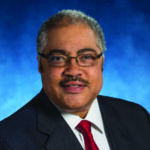Arthur L. Burnett II, MD, MBA, FACS, presented “Real-Time Intraoperative Neuromonitoring of Erectile and Urinary Functions During Radical Prostatectomy” during the 44th Annual Ralph E. Hopkins Urology Seminar on February 6, 2025, in Jackson Hole, Wyoming.
This content is available free to the GRU Community. Login or create an account to view it.
How to cite: Burnett II, Arthur L. “Real-Time Intraoperative Neuromonitoring of Erectile and Urinary Functions During Radical Prostatectomy.” February 6, 2025. Accessed Nov 2025. https://grandroundsinurology.com/real-time-intraoperative-neuromonitoring-of-erectile-and-urinary-functions-during-radical-prostatectomy/
Real-Time Intraoperative Neuromonitoring of Erectile and Urinary Functions During Radical Prostatectomy – Summary
Arthur L. Burnett II, MD, MBA, FACS, explores the future of intraoperative neuromonitoring in radical prostatectomy, aiming to improve nerve preservation and functional outcomes. He begins this 19-minute presentation by discussing the complexity of cavernous nerve anatomy, sharing advances in neurostimulation techniques, including sacral-level spinal electrodes and real-time nerve mapping, that offer new possibilities for identifying and protecting functional nerves during surgery.
Dr. Burnett shows how machine learning and artificial intelligence are integrated into this approach, allowing for real-time intraoperative feedback to enhance surgical precision. Novel imaging and electrophysiologic mapping techniques are being developed to localize and selectively preserve erectile-function-specific nerves. Postoperative innovations, such as implantable neurostimulators, are also under investigation to accelerate nerve regeneration and erectile function recovery within months of surgery. The potential impact extends beyond preserving erectile function, with implications for urinary continence and overall patient quality of life.
Dr. Burnett underscores that while nerve-sparing techniques have advanced, integrating real-time neuromonitoring represents the next frontier in improving surgical outcomes. This evolving technology may fundamentally change how radical prostatectomy is performed, and ongoing research will determine its clinical adoption.
About The 44th Annual Ralph E. Hopkins Urology Seminar:
The Ralph E. Hopkins Urology Seminar is a multi-day meeting focused on training urologists in the latest in assessing, diagnosing, and treating urologic conditions in the clinical setting. Updates are provided on urologic cancers, stone disease, urologic reconstruction, female urology, infertility, sexual function, emerging surgical techniques, and general urology. The 44th iteration of the meeting took place from February 5th to February 8th, 2025, in Jackson Hole, Wyoming.
For further educational activities from this conference, visit our collection page.
ABOUT THE AUTHOR
Arthur L. Burnett II, MD, MBA, FACS, is a Professor in the Department of Urology, Director of the Basic Science Laboratory in Neuro-Urology, and Director of the Sexual Medicine Fellowship Program at Johns Hopkins University School of Medicine. His professional appointments at the Johns Hopkins Hospital include Director of the Male Consultation Clinic and Clinician-Scientist at the James Buchanan Brady Urological Institute. Dr. Burnett earned his undergraduate degree in Biology from Princeton University and his medical degree at Johns Hopkins University School of Medicine. He completed his internship and residency in Surgery and residency and fellowship in Urology at the Johns Hopkins Hospital. After this, Dr. Burnett received an American Foundation of Urologic Disease New Investigator Award to continue research into the regulatory mechanisms of penile erection. Since then, he has maintained an active laboratory in neuro-urology.

